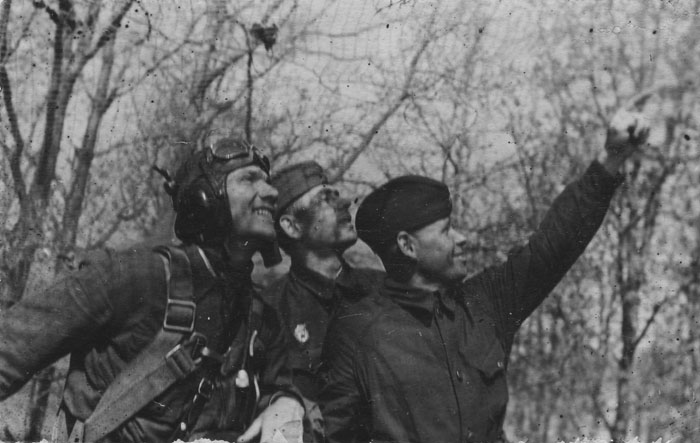
3rd squadron. Pilot Sytnikov, mechanic Sharpilo and weapons officer Semenov
| |
| |
Interview with Korobova (Golubeva) Raisa Fominichna by Oleg Korytov and Konstantin Chirkin
My name is Raisa Fominichna. Surname Golubeva, but maiden surname
was Korobova. I was born on 29th November 1922, near Voronezh. My parents were
ordinary peasants. There were four kids in our family. I cannot recall my mom,
because she died early. Dad perished during war, when Red Army retreated from
Orel.
I graduated from seventh grade in regional center school. By this time dad had
to leave us in search of well-paid job. He took oldest sister with him, and later
he came after me too. I studied at the 8th grade in Khimki, near Moscow. However,
I had to start working at the aviation plant No 301. In 1939 I graduated from
FZU as a specialist assembly worker. We built single engine fighter planes, LaGGs,
if I remember correctly.
— What was your degree? In addition, how much did you earn?
When we studied, I had a stipend of 200 rubles. I graduated with 4th degree. It was pretty high level, so I was taken to the assembly line. At first we received small money — 300 rubles. However, it increased with time.
—How did you found out about War?
It broke out on Sunday. But for us it was a working day. I was in a hurry to
work, when an announcement was made over radio. I did not pay any attention to
it. I came to work and asked there:
— Guys, what was said over there?
They replied:
— “Over there” it was announced that Germany had attacked
us.
—You said that you worked on Sunday, but wasn’t your plant working for a five-day period?
Yes, it was a voluntary overtime work…
At the beginning of the War, we were evacuated to Novosibirsk.
— When did it happen?
I cannot recall now… But we left before air raids on Moscow began. When we were leaving Moscow, it was under lights camouflage, but when we made it to Kazan, it was fully lit yet.
— How evacuation was organized? You were told about it in advance, or maybe there were some rumors?
It was well organized. We were told that on the next day there would be a train sent after us to the plant. For each man we were given a cart number to board into. We were reminded that we could take only minimal amount of luggage with us, so only the most necessary things were to be taken. Then we left.
— Did you take the machinery with you?
Yes, but not everything. Some was left behind.
—Were there people who did not evacuate?
Yes, there were some, they stayed behind and kept working, repairing battle damaged tanks… While we went to Novosibirsk...
— When your plant began to work again?
We began working at Chkalovskii aviation plant, which built Yaks. I worked as an assembly line controller.
— So you worked at the other, local plant?
Yes, we were transferred to other plant while ours was not yet operational…
— Where did you live?
Evacuees were settled in hostels, but there was no room for everybody, for
example, my sister and I had not had any place to live in. We were sent to the
private sector. The women, to whose apartment my sister was sent had no place
for us both, while my landlords, an old man and his wife suggested us themselves:
— Sisters should not be separated, let us live altogether; there is
enough room for all of us…
They met us very well, invited us for tea. They were wonderful people…
— Was there working uniform for you at the plant?
There was no special uniform, only our own clothes that we brought with us. At Chkalov plant, nothing was issued to us, with an exception of those who had to work in special conditions like in thermal shop.
—For how long did you work at the assembly line?
Not for long. At winter of 1942we were summoned to Komsomol Committee, where
we were told:
— Stalin had issued an order to enlist women to the positions where
they can be useful. Freed males can be used in combat units…
If needed — I was ready to go. One girl said:
— I do not want to go! I am afraid!
She got a reply:
— It is not obligatory, if you are afraid, we will not enlist you.
Those who agreed were advised to buy out food rations, which were supposed to
be given for food cards. Actually, there was nothing to buy, except bread.
We were given a superior, and we set off to the town Ishim. There we were sent
to the military school, where we studied weapons. Things that were taught before
in 6 month time we were given in just a month…
— Were there problems with studying?
We studied more or less successfully, because we were very into studying…
— What you were taught?
To assemble and disassemble machine gun and cannon, to arrange synchronizer, so that it would not hit airplanes own propeller blades…
— Did you fill in the ammunition belts with rounds?
Not in the regiment. They were brought to us by a ZiS truck already prepared.
Nevertheless, I still had to look through it, and if I found suspicious round
I would take it out and change with new one. We also had to check the fuses,
to make sure that shells will not explode in the barrel. For all time of war,
there was not a single case when guns serviced by me would jam or misfire…
We studied for a month, graduated, and were sent to Moscow. When we arrived there,
we had no information or directions where to go. Our Komsorg was Lyubov Tikhaya
(maiden surname Kudryavtseva). She went somewhere and returned with assignment
to the front. We came to Michurinsk, where our train was shelled by artillery.
We returned to Moscow on that same train. When she went to the Directorate, she
was told:
— Situation is changing very fast. We did not know that there were
problems. Go to the Kalininskii Front.
Kalininskii Front was near Moscow. Right after our arrival, we were bombed. Then
we were told:
— Spend a night here, tomorrow we will find a place for you.
We somehow found a place to settle down. That was at summer of 1942. In the morning,
we found out that we were near Pe-2 airfield… Commanding officers looked
at us – we were covered in mud and eaten alive by mosquitoes...:
— Why are you so dirty? Here is soap, go wash yourselves and clean
your clothes…
Half of our group, including me, was sent to 157th IAP, under command of Ovcharov.
He later was taken to the Division level.
— Did your regiment become Guards?
No, it did not, although it should have become. Why? There were problems with discipline. All the time somebody would do something stupid. So we did not receive a Guards title.
— There were many such cases?
Not to say that a lot, but they were all at wrong time. For example, there
was a pilot Borovykh. Either he did not like tea or something else had happened,
but he got angry and pulled a skirt of a waitress in the canteen over her head
and tied a knot. It was considered an act of hooligan...
Canteen belonged to Airfield Service Battalion (BAO). It used to be a cause of
many scandals. There were some chefs that traded provisions with locals, exchanging
grain for potatoes and so on. They were able to feed us pretty well and tasty.
But there was one period when we were fed by barley only. Boys asked our chef:
— When you will stop serving “shrapnel”? And why our superiors
get potatoes, while we have to eat this crap?
This argument had ended when chef was thrown into the river, but nobody knew
that he could not swim. Therefore, boys had to undress and go after him. The
chef was saved, but somebody had informed “competent organs” about
this incident… For the second time a presentation list for Guards title
was called back. But it was not waitresses or chef’s fault, but intendants.
— How you were met in the regiment?
Not badly. Commander ordered:
— Girls had come, stop swearing!
And we really had not heard rude swearing.
We were told later that discipline had seriously improved after our arrival,
everybody began looking after themselves… We were assigned to our airplanes.
My airplanes mechanic was Sumkov, and a good one.
—Wasn’t there any kind of displeasure?
There was nothing like that.
—Were there any problems for women?
What kind of problems? We were demanded to be only in working relationship among each other…
— What about problems with clothes?
Oh, yes, there were problems: we were issued soldiers underwear and soldiers
blouses, so we cut the “legs” off these pants. Some time later, we
had to exchange it for clean ones, and our cutaway pants were issued to the men:
— What is going on here?
They understood what happened and gave them back to us.
— What kind of uniform did you wore? Skirt or pants?
Both. When we worked at the airfield we had to wear trousers or working suit. When we were at home or out of the airfield we wore skirts and soldiers blouse. And always we had soldiers’ boots. I do not know where our Starshina got them, but everything was of good quality. At winter we received valenki.
— What about specific underwear for women?…
Everything was quite simple: our Starshina issued them to us, exactly the ones we needed. He had noted down our sizes. We had excellent Starshina. If there was any need – we went to Starshina, he would arrange everything.
— What kind of hairdressing was allowed? Or you had to cut your hair short?
Only once, when our commanders went after new airplanes, and Adjutant and Commissar
were left as chiefs, they ordered us to cut our hair short, like males did. When
commanders returned, they looked at us and said:
— What for did you issue this order?
— How many women were there in technical crew of the regiment?
When we came — 10. After that, five more instrument specialists arrived.
—Were there girls demobilized due to pregnancy?
There were some cases, but not a lot. We did not count. Four, maybe, for all
time. A general once came to our hostel with inspection:
— How are you doing?
— Fine.
— Are there any pregnant ones?
— Not a single one so far.
— Will there be any?
— I have no idea.
— Wasn’t there some kind of supremacy of pilots towards ground crew, since they were fighting the enemy, while you sat on the ground?
No, nothing like that. How could they say that: «We fight…».
What they fought with? We provided them with weapons.
My commander did not allow me to work with anybody else, because my weapons never
misfired. But it was difficult to achieve, there was always lack of time, and
I had to work with weapons at night, while at daytime I examined each shell from
a box. There was a drastic lack of sleeping time.
— What kind of airplanes was your regiment equipped with when you arrived?
Yaks. Yak-7.
When new airplanes came from Chkalovskii aviation plant, a disaster struck. These
planes were faster, but it caused higher wing load. At first, we could not understand
what happened, why skinning ripped off the wings…
— There were a lot of such cases?
Yes, quite a lot. And many boys were lost after spinning out of control...
Our General almost went crazy:
— I had lost so many pilots for no obvious reason!…
One very experienced pilot was caught by this situation, but he had managed to
land his airplane. So we finally got the possibility to understand what had happened.
When reason for crashes was cleared, a team of workers had arrived to our airfield,
and repaired all planes. They made a tent out of canvas and glued the wings.
Everything was done quite fast, and everything become normal.
—What kind of weapons did you have on Yaks?
On the first ones, two synchronized BSs and ShVAK cannon. Then we received large 37mm cannons and two machine guns… There also were provisions for adding wing gun pods, but we never actually saw them.
—Did pilots ask for special ammo loadout? There were different shells available: AP, HE, tracers…
Their only wish was to have tracers. But it was not our job to load the belts,
we were given ready ones as we ordered.
— How long did it take to rearm a plane: bring ammo belts
to the plane, load them… Where did you keep the ammo?
I cannot say about BAO, but it was their job to provide us with shells, they brought it to the armory, which was separate for each squadron.
— That is, ammo was brought there, you collected it and
carried it to the plane? Ammo belts were 120 rounds, so did you drag them all
in one piece or in bits?
In short bits. I then assembled belt as long as I wanted. I had everything prepared.
Belts were held in the boxes. When airplane would land, I began rearming machine
guns first, then cannon. No more then 20 minutes to prepare an airplane. There
was no possibility to work slower, because I would be kicked off the regiment…
— Wasn’t this metal too heavy for you to carry?
It was heavy. Once Germans attacked our airfield when I was carrying these
belts. I thought only of the ammo… I still do not know who shouted and
swore at me, and then somebody pulled my leg… I came to my senses in the
trench. Later, when air raid was over, I asked:
— Boys, who swore at me?
— You almost were killed. There is no need to run around with high
explosives in hands.
I even did not think about such outcome possibility, only how to make it to the
plane…
— That is, you were under German air raids. How would you qualify them?
It lasted for a brief time. They shot at airplane parking area, but did not hit anything at all.
— Airplanes were in shelters?
Most commonly, there were no shelters at all. When we were based near forests, we camouflaged airplanes by tree branches…
— How did you hid the light at night?
We would extend canvas over the airplane, and lit the hand-made lamp that were produced from shells. That is how we worked…
— Did you use bombs on your planes?
Cannot say. At one time small ones were used.
— Who hung them?
I do not remember. It was not in my area of expertise, I worked only with machine
guns and cannons. May be mechanic… We also used RSs.
—Who was responsible for weapons controls?
It was instrument control officers work. Once he accidentally pulled the trigger while I was working with the weapons… It fired and hit me in the hand. It was shock — pain and blood… Scary… I ran away, weapons technician followed me, and then squadron commander came… Everything ended quite well...
— Who was you direct chief?
Weapons engineer. If I could not solve the problem, he would come to me and help.
Sometimes, if I completed my work, and mechanic was not ready yet, he would ask
me to help him. Then I would have to do something with an engine.
—Your personal opinion about Yaks armament, was it satisfactory?
Yes. But there were problems and some specialties in working procedure. For
example, if you pulled a holder with all force after reloading, cannon would
fire correctly, but if you would hold it in full aft position without releasing
just a little bit, cannon would misfire.
Pilots knew about this. But our General Katanashvili once summoned us and started
yelling:
— You…! Get there and look, what happened!
I replied:
— I looked there already, it is not weapons technicians’
fault, you rearmed incorrectly. You held the holder and did not release it in
time. Misfire is your own fault.
General went to the division in a very nervous mood:
— Some girl accused me of not knowing how to reload. Go there and
deal with it.
His engineers answered:
— We know of this thing with a gun, nothing new here...
Somebody passed this story to me later…
— How airplanes weapons were aimed?
My commander Zalevskii trusted his weapons to me only. For aiming airplanes were brought to the shooting range, that is an aircraft shelter with drawings on the wall, so that no one would be hurt in process.
— Who adjusted the gun sight?
Usually – instrument technicians. But there was only one true specialist in the regiment – that same Kudryavtsev, who shot me up…
— How your airplanes were painted?
One tone green from above and blue from below. Bort numbers on the fuselage. I cannot remember no FRE on the fuselage or tail, except victory stars. As many stars, as kills scored by pilot. They really attracted my attention.
— And their size?
No more then a palm.
— What about insignias: “For Stalin”?
It was not popular in our regiment, and there was no art on the planes.
— All airplanes were equipped with radios?
Not all at first, but by 1944 all regiment was equipped. In Poland, all planes had a radio…
— How your free time was organized, if there were no missions to be flown?
There were no missions when the weather was bad. We had our own ensemble. Some times actors would come. Maybe twice during whole wartime.
— What about cinema?
Sometimes it was shown to us. But during bad weather too. I have to note, that all entertainment happened during bad weather: rain, snow, blizzards…
— What did your special department and commissars do? Was there any real need in them?
What to tell you… There was a division commissar – he brought only trouble. He constantly tried to find out who said something incorrect…
— Was he a pilot?
No.
— And what about squadron and regiment political department officers?
They were pilots. Who among our staff didn’t fly: Chief of Staff, his deputy and adjutants.
—What pilots thought about political officers?
Nothing, as long as they did not attract any attention…
— Pilots were fed in separate canteen?
Yes, there was separate canteen for pilots and for technical crew. But we had no reason to feel neglected.
— Did you receive 100 grams?
Yes, but I did not drink it. My friend told me:
— Do you think that you are the smartest one? If you are issued some
alcohol, you should drink it!
Male technicians received some tobacco, while we got chocolate instead –
one bar per month. Besides, our commander always gave us his share.
— Chocolate was our or imported?
I did not care at all. However, there was a lot of American food.
— Were there heavy losses in your regiment?
There were. Especially during Kursk battle. There we lost about half of the pilots. We were told that there was largest ever tank battle.
— Who, among pilots, you could recall?
I would immediately recall Zalevskii, our 2nd squadron commander. He perished
during my first year at the front. (Squadron commander captain Vladimir Zalevskii
shot down in a dogfight with a FW-190s on 05.07.1943 in Maloarchangelsk area.
Bailed out. MIA, perhaps, died in a hospital.)
— What was our pilots’ attitude towards German pilots?
Very bad. Why Zalevskii was killed? He hated them… He was so obsessed with shooting enemy plane down, that he lost situational awareness.
— Was there any respect towards the enemy? Or just «Let us at them…»?
There was no such things. One pilot tried to get to our regiment for a long
time. Cannot recall his surname now. He tried to get to us because there were
many awarded pilots, and there were Heroes. So he finally got his wish granted.
It was right at the beginning of Kursk Battle. But he never actually saw combat.
He would take off, and then belly land the plane. After that, he would accuse
technicians. Regiment commander and Regiment engineer even argued over his case:
— Your mechanics cannot properly prepare an airplane!
— No, it is your pilots who either cannot properly fly them, or do
not want to!
An experienced technician was sent to us. He lifted the plane on the jacks, checked
it thoroughly and said:
— It is fine, and I had nothing to do with it.
Pilot kept complaining that it was shaking. Mechanic replied:
— Shaking maybe increased a bit, after he belly-landed it, but there
are airplanes with a heavier shaking, which are flown by other pilots without
any questions.
Chief of staff reported to the court martial. This pilot was tried, stripped
of all awards and sent to another regiment – none of our pilots wanted
to fly with him. Zalevskii said:
— And to whom I can order? I will have to fly with him myself, but
I have to be sure that I have a wingman, while I do not trust this pilot.
—Can you recall any of your Heroes?
I already mentioned Zalevskii… Twice HSU Borovykh. He received second
Gold Star for single handedly chasing away a large group of German bombers in
front of Marshal Zhukov. Zhukov ordered:
— Make him a Hero!
— He is a Hero already.
— Make him twice!
Who else: Baranov, Borovykh, Zalevskii, Maslov… Cannot recall everybody...
—How awards were presented to pilots? Was there any special procedure?
Some top brass would come. There was a line up, a state hymn was played. Awarded men were called out and awards were handed over.
— There are many cases, when a pilot got a Star, and would become too ignorant and selfish?
None of ours suffered from this. Zalevskii was the first in our regiment to receive a Gold Star. He was much liked, so everybody was happy about this award. He was caught, raised by hands and guys began tossing him in the air. When he was thrown in the air, he lost his port cigar. It was golden, very expensive gift from his uncle for good luck in battles. We looked for it, it seemed that we overturned every inch of snow, but still no luck finding it…
— Were there cases of theft at the front?
Not too common, but yes. I experienced it once. Zalevskii, if he went somewhere,
always brought some gifts with him. For example, he brought me a simple spoon,
which I liked a lot. And he had a gift in return, a kerchief, which he always
had on his neck on a mission. Somebody presented it with words: “You are
going to be alive as long as it will be with you”. Once, he gave me this
kerchief, to wash it, but there was no where to iron it. He said to me:
— Bring it unironed. I must have it urgently…
So I ran to our quarters. There I saw that girl, with a bottle of vodka in front
of here…
— Sit down, let us drink!
I replied:
— I do not drink, and I am in a hurry.
I begun looking for kerchief, which was not where I left it. And some other things
of mine were absent. Then, I suddenly noticed that quarter’s owner daughter
was dressed in this stuff. But I had no time to quarrel about this, I just grabbed
kerchief and ran to the parking area, so that Zalevskii would have his amulet
with him in a battle… But I was late… He was killed in that fight.
I still sometimes have a feeling that it was my guilt.
—Were there a lot of superstition?
All pilots superstitious…
— And what kind of superstitions?
They all had some kind of beliefs or amulets. Something personal for each one of them.
— If a regiment was going to be moved, how did you follow it?
Usually by trucks, rarely in a Douglas. Sometimes, pilots would squeeze some technician or mechanic in the rear fuselage.
— Were you in touch with local population in Poland?
Of course? We lived in their houses. What was their attitude towards us? Not too good I guess, but not too bad either. Neutral. Much worse in the Western Ukraine. We were stationed there quite briefly, but still had gained a feeling about it.
— What was your personal weapon?
Carbine. And I was good at shooting it. Pistols were issued to pilots only.
— Where did you finish the war?
I finished it in Germany, airbase Prinzlau.
—Were you in touch with the locals?
Most of them fled, only elderly people remained. One of them said to us:
— You, Russians, are very rough.
There was a “son of the regiment”, who hadn’t finished school
yet. He showed them German photo. There Wehrmacht officer held a newborn baby
by foot over the well just before throwing him down.
And this boy asked them:
— This is what Germans did to us! Why do you think we should be different
to them?
Germans studied the photo and most of them silently walked away… Those
who remained said:
— Russians are very nice people, if they have not killed us all on
sight after this...
— I heard two versions: That Germans were either very disciplined: once they lost, so be it… Or they tried to kill soviet officers even after war ended.
Yes, they shot at us. Their senior generation was very disciplined, unlike
younger ones.
There were cases when they shot at us. I went to the city with another weapons
officer once, but it happened so that I had to return alone. I took my carbine
and went to the airfield. Sturmovik regiment commander gained on me:
— Where are you going?
I said:
— To the regiment?
— Get inside! You could have been killed!
I got inside and he told me that somebody shot at his car. He fired in return
with his pistol and managed to hit attackers arm. There was nothing I could reply.
— If they were captured, would you have shot them?
We had no right to do it. Once reconnaissance airplane came, and Kaznachey
took off in a large caliber Yak to intercept them. Two Germans were captured,
while third one was killed. But those pilots were very ambitious. Regiment commander
said:
— Goryachenko! Get them to ravine, and execute!
Suddenly a Special Department officer came, and asked to interrogate the prisoners.
He was told that they are about to be executed!
He shouted:
— Go stop him…
Goryachenko told us quite disappointed:
— I was about to kill two Germans. I was not allowed to...
— How you were told that war was over?
For us war ended on 2nd May. Some soldier came running:
— Guys! War is over! Berlin capitulated!
We ran out of the dugout, cheering. We took our carbines, and began shooting
at the clock at the tower of the local church…
For that, we almost got caught… There was an investigation, but we did
not tell anything.
We were ordered to present ammunition by count. We went to those, who had unaccounted
ammunition, and they gave us needed ammo.
After 2nd of May our regiment did not fly anymore. On 9th we were assembled and
an official announcement was made:
— War is over!

3rd squadron. Pilot Sytnikov, mechanic Sharpilo and weapons officer Semenov
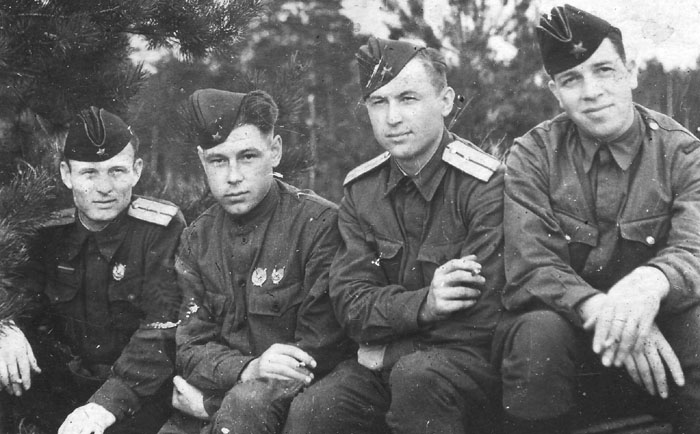
-, Baranov,-, Dyachenko
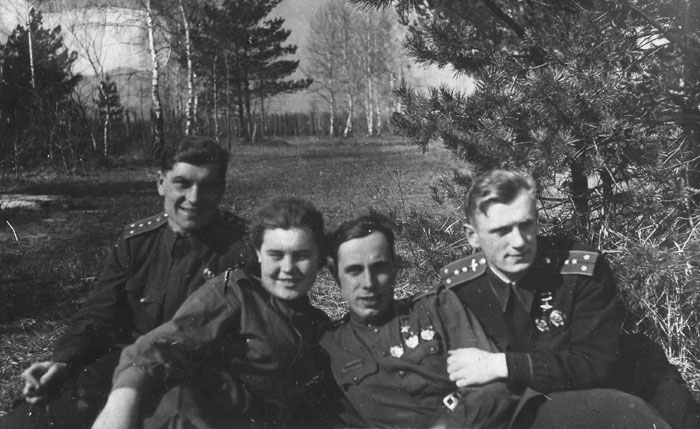
Ovarov, adjutant Zhbanova, Zudilov, Zalevskii
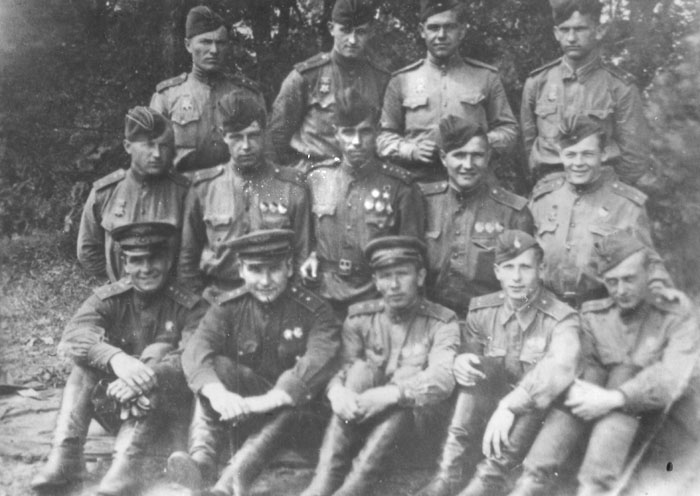
1st row L-R Ovcharov,Yashin,-,Maslov,Kaznacheev
2nd row -,Baranov,-,Borovykh, Stepanov
3rd row -,-,-,-
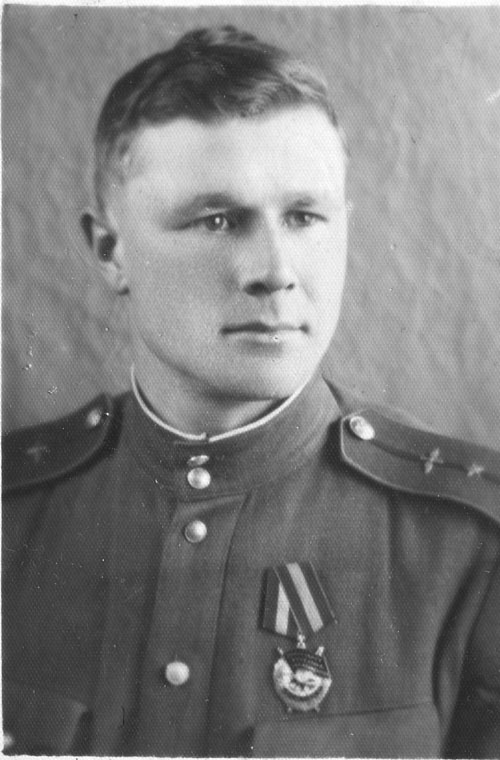
Willisov Nikolay
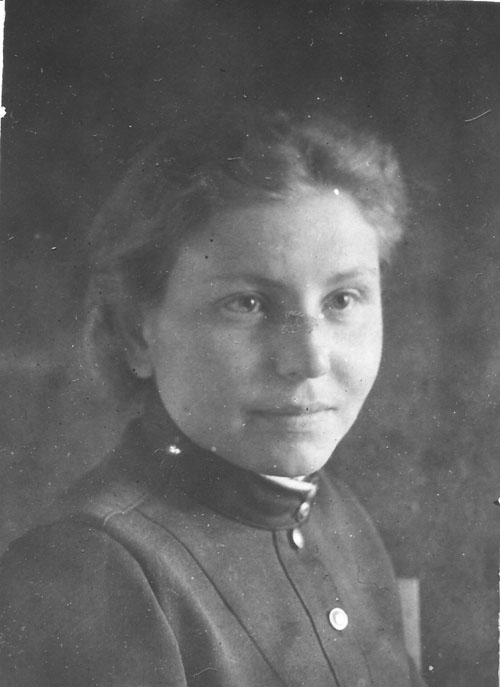
Komsorg Lybov Tikhaya
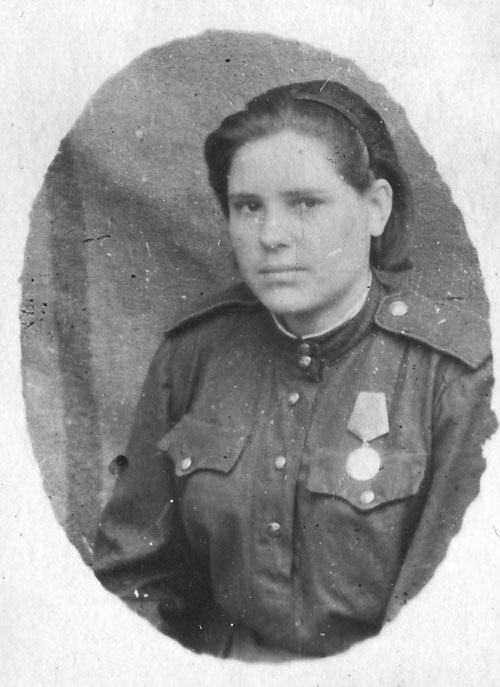
Golubeva 30.05.1944
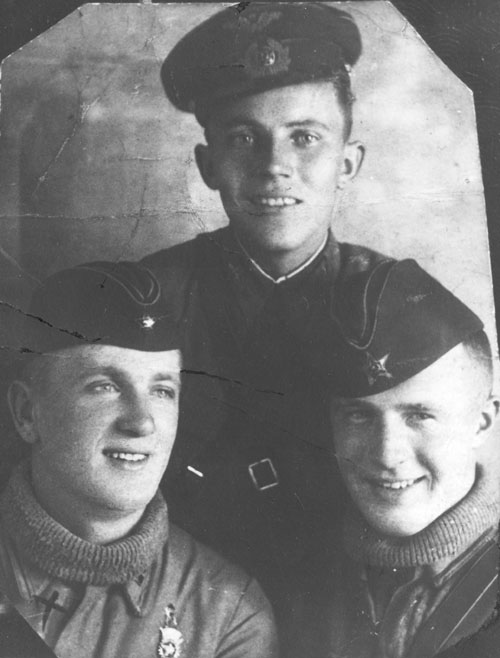
Zalevskii, Shinkov, -
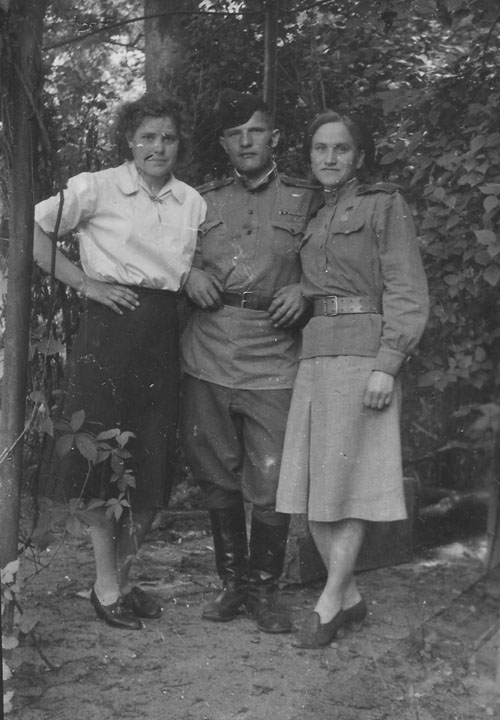
Golubeva, adjutant, weapons officer 1945